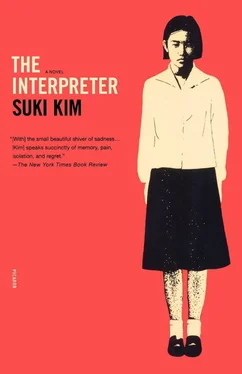The witness from the other day.
The deposition in the Bronx.
Diamond Court Reporting.
Forty-four Burnside Avenue.
The man who had saved a seat for her at McDonald’s, whose gabardine pants and shiny shoes had reminded her of Dad, whose name, if she is remembering correctly, was…
Suzy runs to the kitchen table, where she had dropped her bag upon entering. She unzips the side pocket and pulls out the yellow legal notepad. She flips through the pages. November 10th. Last Friday, November 10th. Five days ago.
Case name.
File number.
Witness information.
Kim Yong Su. Born: 6/10/36. Address: 98-44 Woodhaven
Boulevard, Apt. 8F, Queens, NY 00707
THE BUILDING NUMBERED 98-44 is a red brick co-op. Built in the 1950s, probably. Solid and grim, although here, among the residential complexes called Lefrak City, it is just one of many identical blocks. Two o’clock in the afternoon. Kids running here and there who should really be watched by parents. Old women’s faces at windows who spend their days looking out. Distant howls of stray cats, although in this chill they’ve all gone hiding. From across the street, Suzy counts up to sixteen, roughly. A sixteen-story building. His is situated right in the middle, on the eighth floor. Better there, she thinks. Not too close to the ground floor, where bored hands loiter with not enough cash. But not too high up, for one can never trust the elevator.
She is used to buildings like this. Two-room holes for the entire family. Her parents in the bedroom, and the bunk bed in the living room for Suzy and Grace. Who needs a living room? her parents claimed. They might have had a point. How much living could one do when working seven days a week? Suzy had just started sixth grade when they moved to a real two-bedroom for the first time. From then on, their two-room days were over. Her parents must have been doing better.
It was also around then that Grace began to change. Grace had always been quiet. She had been one of those shy kids, at her happiest when left alone in a corner with a book. But it was in that year, when Suzy and Grace finally got a real bedroom, that Grace began to show signs of withdrawal. The change did not occur overnight, but she became increasingly dark and sullen. Suzy did not understand why, nor did she question. She just got used to her sister’s prickly moods. Later, Suzy thought that it must have been teenage angst, the heightened adolescent sensitivity, which must have hit upon Grace much more severely than it had Suzy.
Once, Suzy tried to draw her out. It was when Grace was getting ready to choose a college. Smith was an odd choice for Grace, who could have gotten into any college she wanted. Although they had moved through countless schools, both girls had always maintained top grades. In fact, it did not take much effort to be the best in class when most students either spoke no English or lacked proper teachers. Smith was certainly good enough, but why not look into other schools before making the early decision? Grace was not interested. She said that she’d had enough of men, which might have been true. But she also mentioned that Smith offered her a full private scholarship. Grace would not accept any other aid. No federal grant. No financial aid. No support from parents. Suzy failed to understand the reason. They were more than eligible for financial aid. Who really cared whether the scholarship came from a government agency or a private donor? What difference did it make, Suzy thought, as she herself went off to Columbia a year later with a good enough aid package to cover her entire tuition and dorm fee. But Grace was adamant. When Suzy tried to point out the absurdity of her insistence, Grace lashed out, “You’re so fucking stupid, Suzy, you wouldn’t care what kind of money it is as long as it puts food before you, would you!”
During her first year away, Grace phoned only once, to say that she wouldn’t be coming home during the breaks. Oddly, her parents did not seem too upset. If they were worried about her, they did not show it. In fact, they avoided mentioning her name altogether. Once, Suzy remarked casually at dinner, “I wonder how Grace is settling in.” They just ignored the comment. They seemed almost relieved that she was gone. For the final few months, Grace had barely spoken to the rest of the family. She seemed ready to leave home forever. Suzy did not think that her sister would ever come back, certainly not move back home, the way she did a few years later.
Without Grace, the house became unbearable. Although Grace had never been a source of warmth for Suzy, her absence made Suzy feel strangely alone. Her parents had just bought the shop on Tremont Avenue. Both had been working at different fruit-and-vegetable stores for a few years, Mom as a cashier and Dad doing delivery. None of the other jobs had panned out. Dry cleaning didn’t bring in enough cash; fish markets smelled nasty; clothing repair was taxing to the eye; nail salons were toxic; liquor stores got robbed too often; car services were too prone to accidents. Miraculously, they seemed to have saved enough to buy a store, which also meant that they came home even later.
Running their own business made them perpetually anxious. There were nights when they did not come home at all, because the store was open twenty-four hours. Suzy never got to see it. The less she knew, the better, Dad said. A fruit-and-vegetable market, nothing to see, nothing to learn. When Mom mentioned how other kids helped out, Dad balked: “I’m not slaving away in this goddamn country to have my kids cut up melons!” And that put an end to that. Suzy was secretly relieved. She’d seen Korean markets. They were familiar sights around the city. While the rest of the country had 7-Elevens and Pathmarks, New York City had Korean markets, where one could find almost anything at any hour, fresh and cheap. They all had the basic setup of fruits and vegetables, bunches of flowers in buckets, stacks of groceries on shelves, and salad bars and fruit cups. But the key was that almost all the food items were fresh; nothing was ready-made. They even sold freshly squeezed carrot juice.
The thought of seeing her parents at work made her uneasy. The twenty-four-hour market. The sleep-deprived wife behind the cash register. The bossy husband in a baseball cap hauling boxes in the back. The confused customers gesturing to workers, none of whom speak English. Such an absolute immigrant portrait terrified her. And she knew that the only one who would understand such fear was Grace. Grace had been her American ally. Grace had always been there as a shield. Without Grace, her home became a refuge for two overworked immigrants and Suzy, the interpreter of their forsaken lives.
And then there were those bills to sort out. Grace had always taken care of them. Suzy was suddenly lost without her. She had never had to calculate deductibles from the balance due or fill out loan applications. Luckily, by then her parents had learned to operate within the Korean community. There were people whom they could consult in Korean, an accountant or an insurance agent. When they absolutely needed to communicate in English, they got by in their broken English. Her parents never relied on Suzy the way they had with Grace. Because Grace was older, Suzy assumed. Grace knew how to get things done. But sometimes it almost felt as if it was Grace who wouldn’t let her. All those times when Grace was stuck having to translate for Mom and Dad, she never once asked Suzy for help. When Mom suggested Suzy take a turn, Grace snapped, “Leave her alone,” and then said loudly, so Suzy could hear, “She’s too slow, she’ll never figure it out.” That did it. Suzy never offered to help. Let her deal with the mess, she thought sulkingly. But now that Grace was gone, Suzy thought perhaps Grace had been right after all. On the rare occasions when Suzy had to read over a confounding notice from creditors, she wondered how Grace had managed, gone all day as Mom and Dad’s personal interpreter.
Читать дальше












